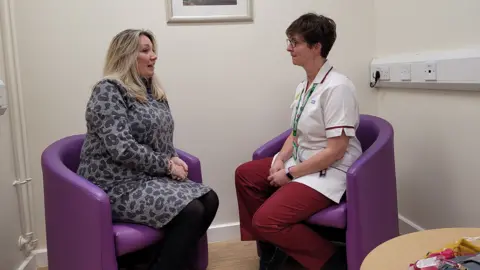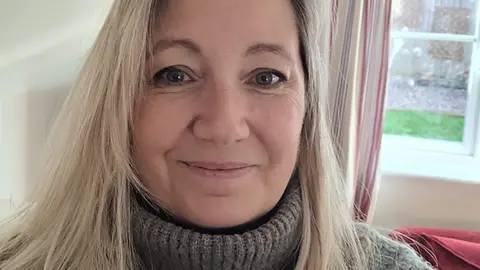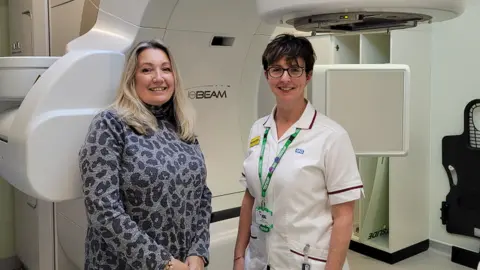West Country hospitals pioneer new radiotherapy late effects service
 Macmillan
MacmillanPeople who have been treated for cancer with radiotherapy are set to benefit from a new service to help them cope with its long-term consequences.
Funded by Macmillan Cancer Support, the Radiotherapy Late Effects Service will give specialist support at four centres across the west of England.
Rebecca Quick, 52, had bowel cancer and said the service "would have been life-changing" for her.
More than 600 people will benefit from the service in the first two years.
Ms Quick, 52, from Cheltenham, was diagnosed with pelvic radiation disease (PRD), a type of late effect caused by radiotherapy for bowel cancer that has caused a range of symptoms.
"Although I was given the all-clear from the cancer in 2018, I've since had to live with things like intense stomach pains, incontinence, back pain, diarrhoea and nausea," she said.
"All of that together can make you clinically depressed because you're worried about what will happen if you leave home."
 Rebecca Quick
Rebecca QuickThe mum-of-five initially put her symptoms down to tiredness and the strong chemotherapy drugs that were part of her cancer treatment.
But doctors discovered that scar tissue from her radiotherapy had blocked the tubes between her bladder and kidney.
She said: "It's strange because you realise radiotherapy has saved you from cancer but it has damaged your body for life.
"Now when I go out, I have to have so many back-up plans in case my symptoms flare up. It's not just plan B, it's plan C, D and E."
 Macmillan
MacmillanMs Quick has been involved in helping set up the new services at the Bristol Haematology and Oncology Centre, Cheltenham General Hospital, Musgrove Park Hospital in Taunton and Royal United Hospital in Bath.
Help available will range from lifestyle changes and self-management through to prescribing, counselling and specialist referrals.
Macmillan Cancer Support provided £462,000 for the project, with Somerset, Wiltshire, Avon and Gloucestershire (SWAG) Cancer Alliance providing £165,000.
Macmillan strategic partnership manager, Shelley Orton, said the service was "a real step forward" in filling "a gap in support for people who are often suffering from life-changing effects caused by cancer treatment".

Follow BBC West on Facebook, Twitter and Instagram. Send your story ideas to: [email protected]
